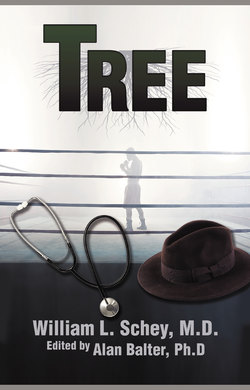Читать книгу Tree - William Schey - Страница 1
На сайте Литреса книга снята с продажи.
Chapter 1
ОглавлениеNorth Korea
With a stop in Hawaii to refuel, the flight lasted almost 18 hours. Storms over the Pacific made it unusually turbulent, and the only noise louder than the drone of the engines was the sound of men retching into their barf bags. Finally, they landed, and the pilot taxied toward a dingy terminal. “Where the hell are we?” one of the men asked as he exited the troop carrier.
“Pyongyang, not that I know where that is,” the guy next to him grumbled.
“It’s so cold, brown, and gloomy, we could be on the moon for all I know,” another one said.
Actually, they were in North Korea to replace troops who had been wounded in a skirmish when the first cavalry moved north. The brass called it a “police action” as if it wouldn’t hurt quite as much when they got their brains blown out.
The men were directed to a Quonset hut where they waited to be briefed. Everyone stood when Lieutenant Carlson entered the room. “At ease,” he said. “Light ‘em up and listen.”
Carlson was “colorful,” to say the least. A big man, about twenty pounds past stocky, his stomach lopped over his belt. With a red buzz cut, scraggly mustache, and a florid complexion, his presence commanded attention. His speech, somewhere between a roar and a bellow, was peppered with profanities.
“We are facing a situation of good versus goddamn evil,” he began. “The commies are godless pricks who aim to take over the world. General MacArthur’s plan is to chase the little bastards back north, and that’s why you’re all here in their fucking capital. Our job is to break the North Koreans’ will to fight and help unify the country so the people can enjoy a Christian democracy. We figure their chicken shit troops will hightail it out of here when we push their sorry asses further north. Count on it. They’re gonna abandon their posts, and bingo, this whole goddamn war will be over.”
The next afternoon, the replacements were divided into groups of twenty and loaded onto armored vehicles before moving out on a rutted and rocky road toward the front. One of the drivers dropped a lit cigarette on his lap, and, while engaged in a frantic search, he lost control of his truck. It careened over an embankment, plunged about 30 feet, and overturned. Miraculously, no one was killed.
Five men suffered a variety of minor injuries but were well enough to press on. Judging from the grotesque appearance of his lower leg, one man had a broken ankle. A second was bleeding from the side of his face and couldn’t see because of gravel and other foreign material in his eyes. Without a shot being fired, these two guys were the first casualties in the unit. For their wounds, they would get free medical care and a ride home.
Carlson ordered them back to base, and less than 24 hours after they had arrived, both were aboard an airlift to Japan and medical treatment. It happened almost as rapidly as a round trip to Grandmother’s house for Thanksgiving dinner.
The two spoke some on the way to Tokyo, but they lost contact soon after arriving at the hospital. The medical care was good enough. Each was seen in a timely manner, but the eye needed additional treatment from a specialist in San Francisco, and the ankle needed more surgery in Hawaii.
Both men recovered without complications. They didn’t meet again until they ran into each other while applying for admission to a college back in Chicago. The government would be paying for their education, so why not?
At school, they recognized each other immediately. One of them, Jonathan Karlin, was from a suburb north of Chicago. He had the option of working for his father in the family’s metal design business but chose to give college a try, thinking that it might motivate him to strike out in a different direction. The other, Jackson Dunn Jr., grew up in a suburb south of Chicago where his father was a foreman at a steel mill. Like Jonathan, Jackson looked to higher education as a way to find a career that would be different from his father’s. “I might be interested in something less run of the mill,” he joked.
Prior to his brief sojourn to Korea, Jackson had some success in the boxing ring and went on to fight, for very little monetary reward, in a few minor professional matches. The army probably saved him from getting hit in the head too many times, but still, he liked to box. He had enjoyed the opportunity to serve his country as well, albeit briefly, and although his injury caused him to limp, he was clear of mind and ready to move on with his life.
Jonathan was a different sort. Studious enough and bright, high school wasn’t much of a challenge, and he did very well. Contrary to most of his high school buddies who were intent on avoiding the draft, he signed up despite the fact that his father might have pulled some strings to keep him out. He had seen almost no action; nonetheless, he recognized that the service wasn’t for him. It was too regimented and rigid, especially the requirement that orders from above had to be followed without debate, and afternoon naps were out of the question.
The injury to his eye came at exactly the right time. It was major enough to get him home with an honorable discharge before he was injured more seriously or got court-martialed for going AWOL.
